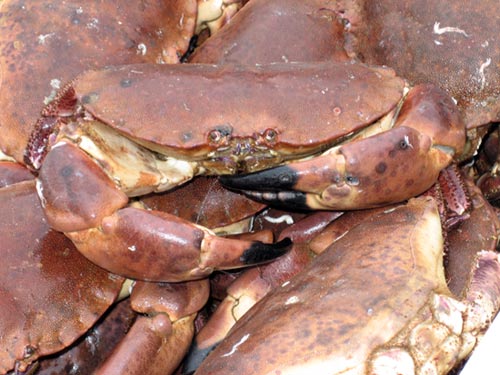Fish Fade Away, Crabs Take Over

Global warming has caused dramatic shifts in some aquatic communities in which fish populations die off and lobsters, crabs and squid move in. The finding comes from a new analysis of 50 years worth of fish-trawling data collected in Narragansett Bay and adjacent Rhode Island Sound but may apply elsewhere, researchers said. Resident fish communities have progressively shifted from vertebrate species (fish) to the invertebrates (lobsters and crabs); from bottom-feeders to species that find their food higher up in the water column; and from larger, cool-water species to smaller, warm-water dwellers. "This is a pretty dramatic change, and it's a pattern that is being seen in other ecosystems … but we're in the relatively unique position of being able to document it," said Jeremy Collie of the University of Rhode Island, leader of the new study. Collie said that while most of the changes observed in the survey occurred slowly, an abrupt change appeared to take place in 1980 and 1981 when benthic species (or bottom-feeders), such as winter flounder and silver hake, declined and pelagic species (or those that feed closer to the surface), such as butterfish and bluefish, increased. "We think there has been a shift in the food web resulting in more of the productivity being consumed in the water column," Collie explained. "Phytoplankton are increasingly being grazed by zooplankton, which are then eaten by planktivorous fish, rather than the phytoplankton sinking to the bottom and being consumed by bottom fish. It's a rerouting of that production from the bottom to the top." Collie also noted that it was the decline of benthic species that had freed up the bottom of the bay for lobsters and crabs to move in. And while the number of fish caught in each trawl increased over time, the size of those fish decreased, which Collie attributes to rising sea surface temperatures in the area — which increased by 3.6 degrees Fahrenheit (2 degrees Celsius) since 1959 — because "fish that live in warmer water are smaller." Fishing could also be a factor because it tends to remove the largest fish from the community, but Collie thinks that climate is "the dominant signal." The findings of the study will be presented in the July issue of the Canadian Journal of Fisheries and Aquatic Sciences. The weekly trawl is funded by the University of Rhode Island.
- Video: Who Pays Most for Earth's Ills?
- Top 10 Surprising Results of Global Warming
- Images: Freaky Fish
Sign up for the Live Science daily newsletter now
Get the world’s most fascinating discoveries delivered straight to your inbox.










